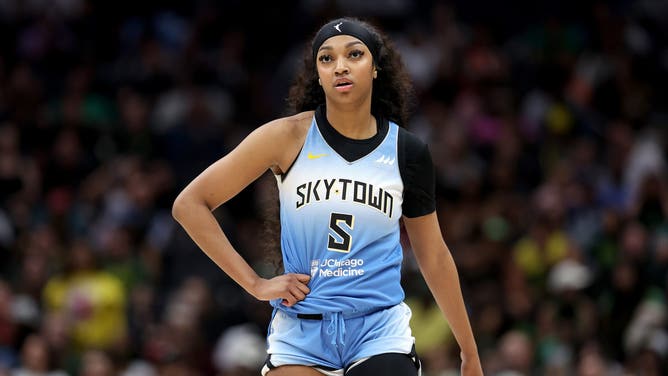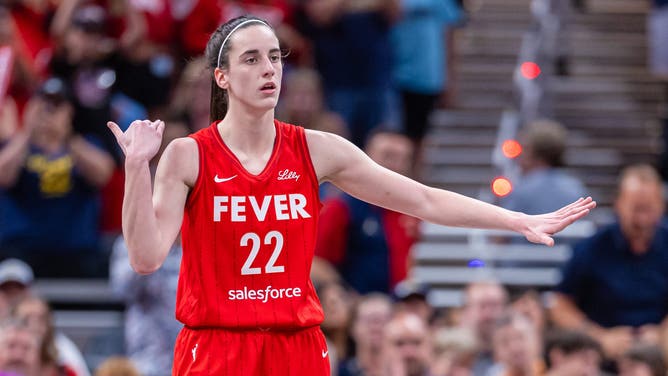Deep Dive Into Angel Reese Stats Paints Grim Picture Of Sky Rookie's Skills
It seemed like a foregone conclusion that Caitlin Clark would win the WNBA Rookie of the Year Award pretty much the moment that the Indiana Fever selected her with the #1 overall pick in April.
But there's rising discussion about the #7 overall pick, Chicago Sky rookie Angel Reese, as the potential winner of the award. Reese is amassing counting stats at a very high rate, even setting the WNBA record for consecutive games with a double-double (13).
That's not the WNBA rookie record – that's the overall record previously set by Candace Parker back in 2009 and 2010 (12). It's impressive, for sure, but it doesn't really tell the whole story.
The problem is that many of Reese's rebounds come on her own missed layups. In fact, Reese only makes 44% of her layups. She's attempted 185 layups this season and 40 of them have been blocked.

Excitement is building for Chicago Sky rookie Angel Reese to win Rookie of the Year, but her advanced stats are not very good.
(Steph Chambers/Getty Images)
That's not a strong figure for someone who is often called one of the best post players in the league, despite being a rookie.
Plus, if she were really as strong in the post as some people would like you to believe, wouldn't she have more blocked shots of her own?
Reese has blocked seven opponent shots this season, less than one block for every two games she has played. For reference, Caitlin Clark has 17 blocks this season. Clark is a guard who is four inches shorter than Reese.
Reese ranks outside the Top 40 in the league in blocks per game, which again, doesn't scream "disruptive interior presence." (Clark ranks 16th in this stat.)
Angel Reese doesn't convert as many buckets as she should, especially given her average depth of shot attempts.
Reese's offensive efficiency doesn't paint a pretty picture for the Sky rookie. She's shooting just 42% from the field this season, despite the fact that 85% of her shot attempts come from inside eight feet.
Just 18 of her made field goals this season have come from outside the "restricted area." For comparison, Clark has made only 31 shots from inside the restricted area, with the majority of her made shots coming from 20+ feet away from the basket.
Despite an average field goal depth being much farther from the basket, Clark is only slightly worse than Reese at converting shots (39.3% FG vs. 41.8% FG).
The biggest difference between the two players is in their effective field goal percentage. Clark is over 50% in that category and Reese is at just 42%.

Indiana Fever rookie Caitlin Clark (pictured) deserves to win WNBA Rookie of the Year over Chicago Sky rookie Angel Reese, and it's not that close.
(Michael Hickey/Getty Images)
This is not to simply disparage Angel Reese, who is still a very good basketball player and especially good for a rookie. She's a competitor who is unafraid of banging down low with the biggest girls in the WNBA.
She seems to play her best when the stakes are the highest. Those are signs of an elite athlete.
Reese also frequently puts herself in a good position once shots go up, which is part of the reason she's able to secure so many rebounds.
However, she just isn't very skilled. Reese doesn't dribble well, can't shoot at all, and isn't a great defender. No disrespect to her, but Caitlin Clark is unlike anything we've ever seen in women's basketball.
Caitlin Clark is far more skilled than Angel Reese.
As Dan Dakich said on his OutKick show on Tuesday, "Caitlin Clark does things on the basketball court that other WNBA players have never even thought of doing."
Reese, on the other hand, is just like the majority of post players that have come through the league over the past 25 years. She takes the majority of her shots from inside 5 feet and misses a lot of them. She gets rebounds because she's always near the basket.
And for those people who argue that Reese is making her team better than Clark is making her team, that's absurd.

Indiana Fever rookie Caitlin Clark (left) deserves to win WNBA Rookie of the Year over Chicago Sky rookie Angel Reese (right), and it's not that close.
(Emilee Chinn/Getty Images)
The Indiana Fever won 13 games last season. They're on pace to better that total this season and the only major addition was Clark.
The Chicago Sky, on the other hand, added both Reese and Kamilla Cardoso (the #3 overall pick in the 2024 WNBA Draft). Yet, they're on pace to lose more games this season than last year.
Reese is still a valuable player who plays an important role. But it's a role that many other women in the WNBA can play. Clark's role isn't repeatable because no other player can do the things she can do.
That's what makes Clark the clear choice for Rookie of the Year. And, quite frankly, should make her a stronger contender for MVP than the consideration she's currently receiving.